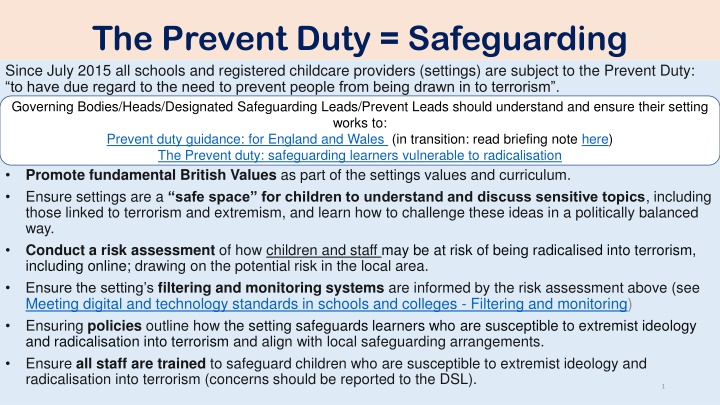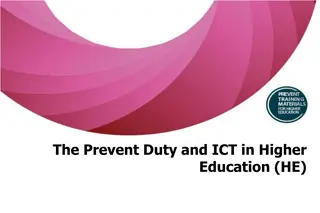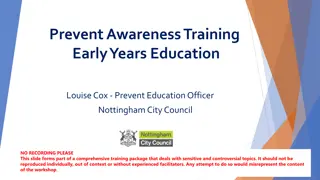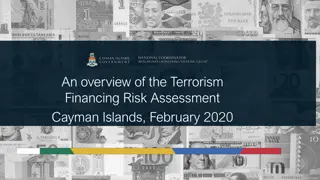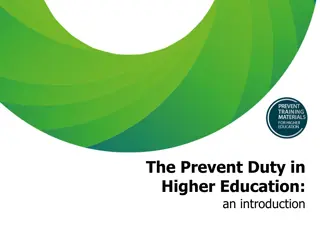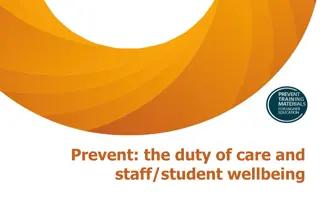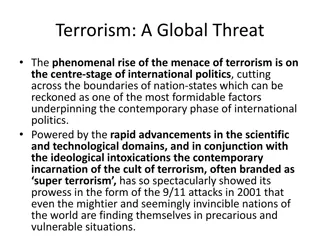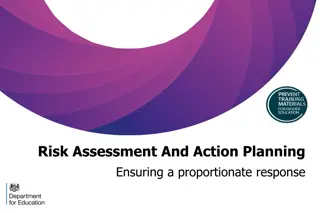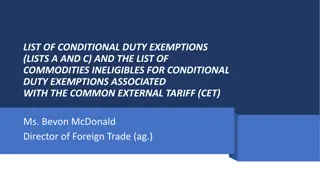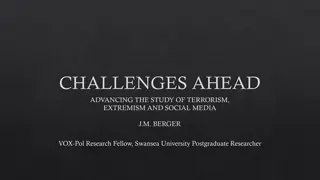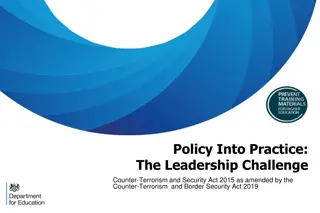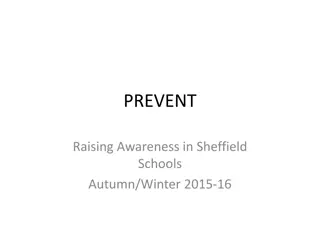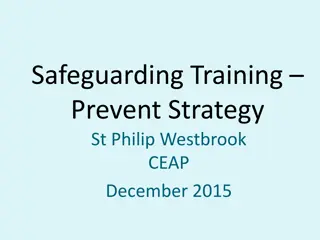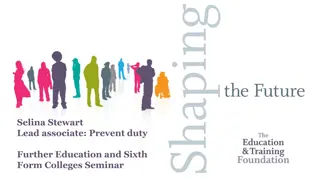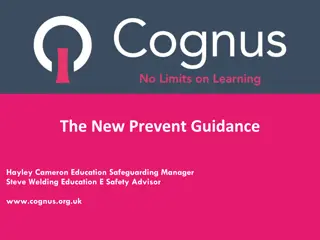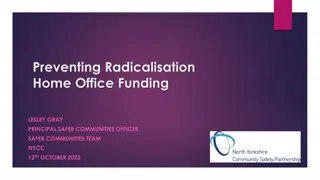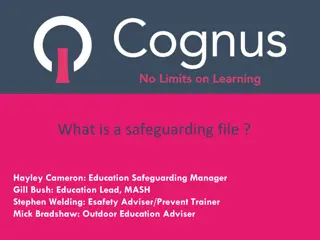Safeguarding Against Terrorism: The Prevent Duty in Education Settings
Since July 2015, schools and childcare providers must comply with the Prevent Duty to prevent individuals from being radicalized into terrorism. This duty involves promoting British values, conducting risk assessments, training staff, and making referrals when necessary. Prevent training is essential for all staff, and local contacts provide guidance and support for implementing Prevent strategies effectively.
Download Presentation

Please find below an Image/Link to download the presentation.
The content on the website is provided AS IS for your information and personal use only. It may not be sold, licensed, or shared on other websites without obtaining consent from the author.If you encounter any issues during the download, it is possible that the publisher has removed the file from their server.
You are allowed to download the files provided on this website for personal or commercial use, subject to the condition that they are used lawfully. All files are the property of their respective owners.
The content on the website is provided AS IS for your information and personal use only. It may not be sold, licensed, or shared on other websites without obtaining consent from the author.
E N D
Presentation Transcript
The Prevent Duty = Safeguarding Since July 2015 all schools and registered childcare providers (settings) are subject to the Prevent Duty: to have due regard to the need to prevent people from being drawn in to terrorism . Governing Bodies/Heads/Designated Safeguarding Leads/Prevent Leads should understand and ensure their setting works to: Prevent duty guidance: for England and Wales (in transition: read briefing note here) The Prevent duty: safeguarding learners vulnerable to radicalisation Promote fundamental British Values as part of the settings values and curriculum. Ensure settings are a safe space for children to understand and discuss sensitive topics, including those linked to terrorism and extremism, and learn how to challenge these ideas in a politically balanced way. Conduct a risk assessment of how children and staff may be at risk of being radicalised into terrorism, including online; drawing on the potential risk in the local area. Ensure the setting s filtering and monitoring systems are informed by the risk assessment above (see Meeting digital and technology standards in schools and colleges - Filtering and monitoring) Ensuring policies outline how the setting safeguards learners who are susceptible to extremist ideology and radicalisation into terrorism and align with local safeguarding arrangements. Ensure all staff are trained to safeguard children who are susceptible to extremist ideology and radicalisation into terrorism (concerns should be reported to the DSL). 1
Prevent training: Everyone in school should complete Prevent training according to their role. Prevent awareness this course is for anyone new to Prevent. Prevent referrals this course is primarily designed for Designated Safeguarding Leads. Leads with designated Prevent responsibilities: training should include information on extremist and terrorist ideologies to enable them to train and advise other staff and support making informed referrals to Prevent where necessary. Channel or Prevent Multi-Agency (PMAP) course this is for anyone who may be asked to contribute to, or sit on, a Channel panel or PMAP. Prevent refresher awareness course this course is for anyone who has already completed the awareness course and would like a reminder of key points. Recommended frequency: at induction and every 2 years Further resources are available at: Educate Against Hate - Prevent Radicalisation & Extremism
Prevent Referrals and Advice Key Local Contacts and Links: Shropshire Council s Prevent Lead (and Channel Panel Chair): Sarah Hollinshead-Bland (Statutory Safeguarding Business Partner) Guidance and Tools: Local: Shropshire Safeguarding Community Partnership Child Exploitation Practice Guidance and Protocol (Preventing Terrorism) National: Managing risk of radicalisation in your education setting and Making a referral to Prevent Referrals: should be sent to ctu_gateway@westmidlands.police.uk. Alternatively you can report via the West Mercia website West Mercia Police. Shropshire Council Education Channel Panel Member: Jane Parsons (Safeguarding Officer). West Mercia Police Prevent Engagement Officer: DC Holly Aungiers: 01386 591815 Advice: If uncertain about whether threshold is met for a Prevent referral, contact West Mercia Police on 01386 591821 for a consultation For assistance with completion of a Prevent referral form, contact the West Midlands Prevent hub 0121 251 0241. Regional DfE Prevent Co- Ordinators.
CTLP (Counter Terrorism Local Profile) The current UK threat is substantial, meaning an attack is likely. Further national information and data: Data on the use of Police powers is regularly shared at Counter-terrorism: Research and Statistics A maintained list of: Proscribed terrorist groups or organisations Data on: Individuals referred to and supported through the Prevent Programme statistics West Midlands Regional Threat Highest threat: Islamist Terrorism thematic (political and violent interpretations of Islam used by such groups as Al Qaeda and DAESH). Let's Discuss: Islamist Extremism - Educate Against Hate Medium Threat: (makes up a large proportion of referrals in Shropshire) Extreme Right Wing Terrorism thematic (cultural nationalism; white nationalism; white supremacism). Let's Discuss: Extreme Right-Wing - Educate Against Hate Low Threat: The Left Wing, Anarchist and Single Issue (LASIT) threat. Let's Discuss: Extreme Left-Wing, Anarchist and Single-Issue Extremism - Educate Against Hate .Single Issues to be aware of include: Incel Movement (SSCP Incel Briefing at: Preventing Terrorism in Shropshire Shropshire Safeguarding Community Partnership)
PREVENT RISK ASSESSMENT Settings must conduct a risk assessment of how children and staff may be at risk of being susceptible to extremist ideology and radicalised into terrorism. The risk assessment should also consider online and in-person risks and draw on the potential risk in the local area. Heads/DSLs/Prevent Leads should complete and share with the Governing Body: Prevent duty: risk assessment templates and guidance The risk assessment should inform the settings filtering and monitoring systems and practices: (see Meeting digital and technology standards in schools and colleges - Filtering and monitoring)
What is Channel Panel? The panel is a multi-agency group to identify and provide early support to individuals who are at risk of being drawn into terrorism or supporting terrorist organisations, regardless of age, faith, ethnicity or background. What is the Prevent Programme? This is about early intervention to address the personal and social factors which make people more vulnerable to being drawn into terrorism. What is the Prevent Duty? Section 26 of the Counter-Terrorism and Security Act 2015 places a duty on certain specified authorities to have due regard to the need to prevent people from being drawn into terrorism Its aim is to divert people away from being drawn into violent ideologies and criminal behaviour that could harm themselves or others. For more information about Prevent go to: ACT Early | Prevent radicalisation Revised Prevent duty guidance: for England and Wales - GOV.UK (www.gov.uk) How do I get support for myself or someone else? To make a referral. Please send your completed form to: ctu_gateway@westmidlands.police.uk Who is vulnerable to radicalisation? There are no set profiles but look for: A desire for status A desire for political or moral change A need for identity, meaning and belonging Mental health issues Someone feeling under threat A desire for excitement and adventure You can find the form here: https://shropshire.gov.uk/media/22210/prevent- national-referral-form-v31.docx What is the risk in Shropshire? The Right Wing and Islamist threats remain the highest priorities for Shropshire. What types of ideology are there? Extremists could belong to any of the groups below and are those who believe violence is needed to make their point The far right Faith-claimed extremists Mixed, unclear and unstable Ideologies Northern Ireland-related terrorism Involuntary celibates The left wing Animal rights and environmental extremists What are the signs someone is being radicalised? People may display some, all or none of the signs but look out for: Use of discriminatory language Change of appearance New and lost friendships Withdrawal New found arrogance Right-Wing activity has begun to emerge and the majority of referrals are about this type of extremism. Although it remains sporadic in nature, it is thought there is a level of under reporting of graffiti and stickering attributed to both White Supremacism and White Nationalism. Preventing Terrorism in Shropshire Understanding PREVENT and Channel Panel January 2022 Preventing Terrorism in Shropshire Shropshire Safeguarding Community Partnership
